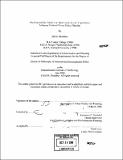The potential for trickle up : how local actors' experiments influence national forest policy planning
Author(s)
Blockhus, Jill M
DownloadFull printable version (16.52Mb)
Other Contributors
Massachusetts Institute of Technology. Dept. of Urban Studies and Planning.
Advisor
Lawrence E. Susskind.
Terms of use
Metadata
Show full item recordAbstract
The loss of forests in Vietnam encouraged central government policy makers to consider new ways to manage forest resources. A major forest policy shift -- moving away from state-led management -- began in earnest in pilot provinces in 1998, with the handing over of forest land and management responsibility to communities. The initial outcomes of this switch and the policy learning that took place as a result of experimentation with community forestry are examined. I show that learning from and sharing these experiences contributed to policy-oriented learning and influenced the formulation of new policy. I review how lessons learned from the field (e.g. local experimentation, project learning and bottom-up planning) can redefine national forest policy priorities. I present preliminary lessons from adaptation of methods of forest land allocation, forest protection regulations and community forest management planning. I share experiences from pilot provinces where, with the involvement of policy innovators (local and external), the results led to the development of an enabling legal framework for community forestry, in the new Land Law and Forest Law. This dissertation suggests how learning from experiments can lead to better policy options in developing countries. (cont.) I explore the critical roles that development of methodologies (combined with networking and training) play in advancing the lessons learned from the district and province levels in two directions - first, sideways, with study tours between provinces and second, upwards, to the national level. I find that local communities are an essential part of the policy process, but it is critical to keep the government (the People's Committee at different levels) and technical agencies abreast of and thoroughly involved in the policy learning and reform effort. In addition to access to community forest resources, I identify how a different type of ownership, that is generated by a sense of pride in the design of the work and creating the means for such ownership in the process -- is critical to this approach. I show how both mistakes and as well as successful examples are important learning tools.
Description
Thesis (Ph. D.)--Massachusetts Institute of Technology, Dept. of Urban Studies and Planning, 2006. "June 2006." Includes bibliographical references (p. 150-162).
Date issued
2006Department
Massachusetts Institute of Technology. Department of Urban Studies and PlanningPublisher
Massachusetts Institute of Technology
Keywords
Urban Studies and Planning.